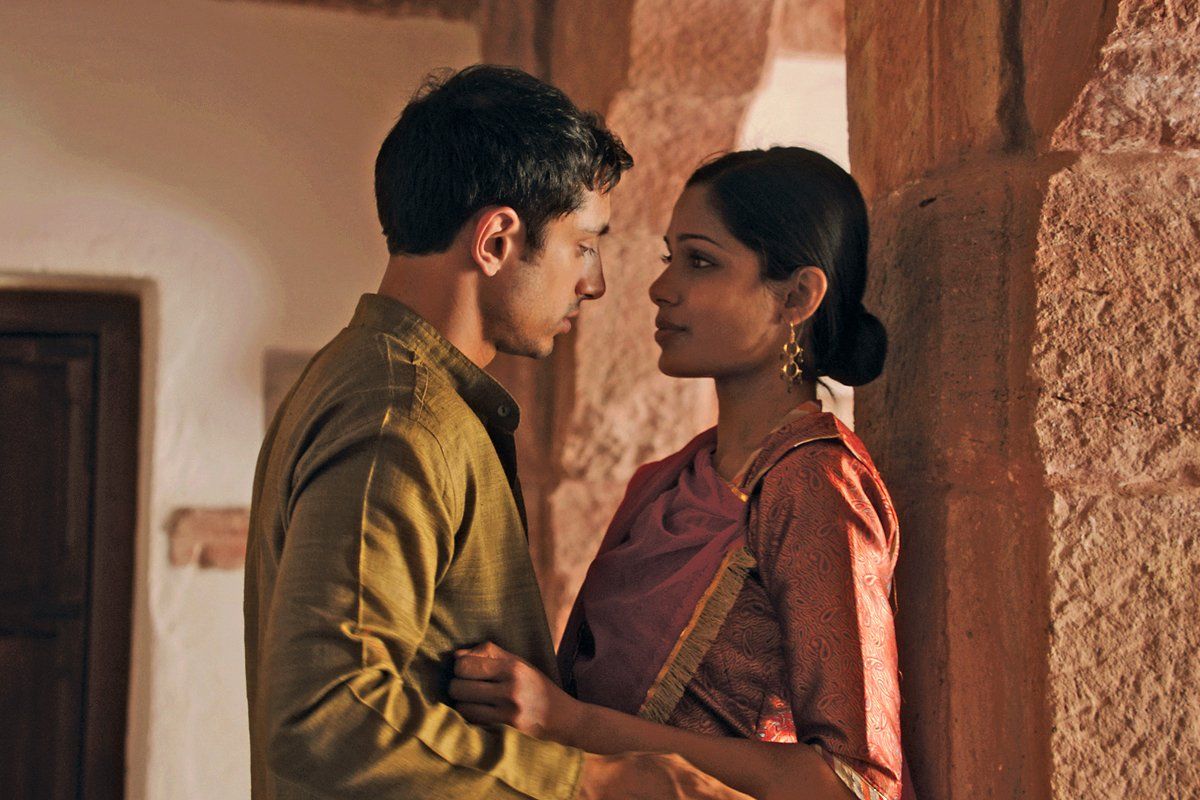
Consider the differences between the two places. Much of Rajasthan is hot and brown, a patch of northern India known for its mountains and deserts. By contrast, the English region of "Wessex"—as depicted by its most famous son, the 19th-century novelist Thomas Hardy—is one big tract of lush meadows and green hills.
But it's the regional similarities that struck British filmmaker Michael Winterbottom when he was working in Rajasthan almost 10 years ago. The rural India of today, like Hardy's Wessex of the 1800s, is a conservative society facing rapid change in the form of workers drifting from the countryside to the big cites, improved schooling, and mechanization. For some members of society, says Winterbottom, these innovations mean life-transforming opportunities; for others, they usher in ruin.
Out of these parallels, a screen project was born. Trishna—which debuted at the Toronto Film Festival last month and will be released in Britain on Oct. 30—reworks Hardy's classic Tess of the d'Urbervilles, switching the setting from the May Day festivals and dairy barns of Wessex to modern Rajasthan. Tess Durbeyfield—that hapless, innocent-eyed maiden—becomes Trishna (played by Indian heartthrob Freida Pinto), a rustic heroine who's seduced by a wealthy hotelier's son. Same problems; different country and epoch. "For me the heart of the story is that Tess has one foot in the old world and one in the new," says Winterbottom. "That's where the tragedy lies."
It's not the first time that Winterbottom has borrowed from Hardy. Past movies include the acclaimed Jude (1996) and The Claim (2000), which relocates The Mayor of Casterbridge to the 1860s California of the gold rush. "Hardy takes ordinary people but imbues their stories with a sense that they are as big and important as anyone else's," says Winterbottom. "He has this great ability to connect the individual with the wider forces of society."
Will it work at the box office? The movie attracted some positive reviews in Toronto, and the presence of Pinto, the former model who made her screen debut three years ago in Slumdog Millionaire, in the title role will certainly help. Winterbottom himself was wowed by his star. "There was really no casting process; I knew as soon as I met her." Her acceptance of the part clinched his decision to go ahead with the movie.
Winterbottom isn't afraid to take big risks. An Oxford graduate, he began his career in British television before moving into feature films in the mid-'90s. Since then, he's directed 17 movies that share little beyond his name on the credits, and he is reportedly now working on The Longest Cocktail Party, a screen account of the last years of the Beatles. (Not that he considers his tally exceptional. Ingmar Bergman, he points out, would sometimes churn out two films in a summer.) "The only connection between them is that they are films that I wanted to make."
The director's interests are diverse. Subjects have ranged from the Manchester music scene in 24 Hour Party People and the Balkans conflict in Welcome to Sarajevo, to an adaptation of Lawrence Sterne's comic 18th-century classic, Tristram Shandy, in A Cock and Bull Story.
Now 50, he's scored some major critical successes, three times winning a nomination for the Palme d'Or at the Cannes Film Festival. On the other hand, he's also courted controversy. The extreme violence of his 2010 thriller The Killer Inside Me tested some fans' loyalty, and 9 Songs (2004), which became infamous for lesbian sex scenes and real onscreen intercourse, took a battering from the critics.
The preference for naturalism won't surprise Winterbottom's admirers. As a director, he's happy to do without a formal script. Simplicity is as much a hallmark as speed. (Trishna was shot in just seven weeks). Says Winterbottom: "I like to work with small crews, I like to work on location, I like to work with hand-held cameras, and I like to allow actors as much freedom to improvise as they want."
Even regular actors aren't always seen as a necessity. In Trishna, the heroine's relations are played by an authentic Rajasthani family, and Pinto spent much time with her screen parents and their children before the filming to prepare for the role. "The dad was a driver just like the dad in the film," Winterbottom says. "They were just being themselves, and Freida was inserted into the house." As a champion of life-in-the-raw naturalism, Hardy would doubtless approve.
Uncommon Knowledge
Newsweek is committed to challenging conventional wisdom and finding connections in the search for common ground.
Newsweek is committed to challenging conventional wisdom and finding connections in the search for common ground.





